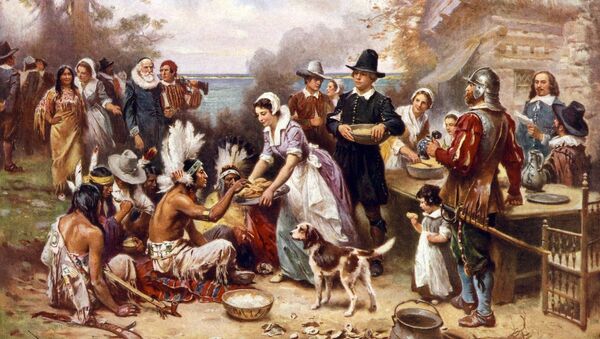MOSCOW, November 27 (Sputnik) — Historically, Thanksgiving was linked to the blessing of the harvest. The holiday has since lost its religious significance and has turned into a family celebration, becoming one of the most popular holidays in the United States.
The idea of holding harvest festivals can be found in most cultures. In North America, this holiday was transformed into prayers of thanks for an abundant harvest, followed by a lavish feast. Some records, from as early as 1607, trace the first instances of European settlers gathering for thanksgiving prayers back to Jamestown, Virginia or to the then Province of Maine.
However, the most popular version of the holiday’s origin is attributed to settlers who arrived from England to what would become New England in North America in late 1620 on the Mayflower. In the autumn of 1621, William Bradford, the founder and longtime governor of the Plymouth Colony settlement, invited local Native Americans to celebrate a three-day festival in honor of the first harvest, collected after a winter of undernourishment in the New World. The Pilgrims, as the settlers were known, managed to grow their first harvest largely owing to help and knowledge received from the Native Americans.
This became the first Thanksgiving Day, but the settlers did not refer to it as such, nor did they plan to make it a tradition. There was no holiday the following year, and only the end of long drought that had threatened the year’s harvest prompted its celebration in 1623. This day of thanks remained an unofficial holiday for a long time. European settlers celebrated the blessing of the fall harvest on a local level, with each state determining the date of its own Thanksgiving Day.
After the US victory over British forces in the 1777 Battle of Saratoga, the Continental Congress recommended that a day of thanksgiving be observed, as such the first official day “for Solemn Thanksgiving and Praise” was held on December 18 of that year.
In 1789, George Washington, the first president of the United States, proclaimed the first nation-wide thanksgiving celebration in America. Thursday, November 26, became “a day of public thanksgiving and prayer.” However, sporadic thanksgiving celebrations continued to be held in subsequent years. Only in 1863 did Thanksgiving Day become a national holiday when President Abraham Lincoln announced that henceforth the last Thursday of November would be celebrated as Thanksgiving Day. Nevertheless, successive presidents did alter the day the holiday fell on. For example, in 1865 Andrew Johnson proclaimed that the holiday be celebrated on the first Thursday of November. In 1869, President Ulysses Grant chose the third Thursday as Thanksgiving Day. In ensuing years, Thanksgiving Day reverted back to the last Thursday of November.
In 1939-1941, President Franklin D. Roosevelt shifted the Thanksgiving Day date to the penultimate Thursday of November, a move that divided the states of the Union. In all, 16 states refused to change the older tradition and continued to celebrate Thanksgiving Day as before. After two years of confusion and complaints, President Roosevelt signed an act to celebrate the holiday on the fourth Thursday of November.
Since Thanksgiving’s inception, a number of traditions, fastidiously observed by Americans, have evolved. It is customary to celebrate Thanksgiving Day with close relatives, at the home of the eldest family member. Family and friends gather together from all over the United States to share a meal of traditional food. Menu staples include turkey, stuffing, sweet potatoes, candied yams, cranberry sauce and pumpkin pie. Historians believe that 17th century settlers had a more restricted choice of food, including wildfowl, corn and venison.
Apple cider, in various guises, is traditionally served on Thanksgiving Day.
The official turkey pardoning ceremony, held at the White House on the eve of the holiday, is another Thanksgiving custom. According to this tradition, at least one turkey is chosen to be spared from the dinner table. Legend has it that the National Thanksgiving Turkey Presentation started in 1947 when President Harry Truman was presented with a turkey by the National Turkey Federation. No record of a bird being pardoned exists until 1963 when President John F. Kennedy spontaneously pardoned a bird presented to him.
President George H. W. Bush instituted the official turkey pardoning ceremony in 1989. Since then, one turkey and its “backup,” chosen as a replacement in case something happens to the first bird before the ceremony, are pardoned each year and do not face the prospect of being roasted for the holiday.
Traditional parades with floats and characters from popular fairytales and animated-cartoons are held every Thanksgiving Day. Philadelphia hosted the first such parade in 1920. The retail chain-store Macy's organizes an annual Thanksgiving Day Parade in New York City. The parade is famous for its huge balloons featuring characters from fairytales, TV shows and cartoons. It proceeds from Central Park to the entrance of Macy’s department store (between Seventh Avenue and Broadway). This parade has been televised in America since 1952.
American football has become an integral part of Thanksgiving for many Americans. Games of all levels are played, from amateur to college to professional. Turkey Bowl is the name given to informal games played by families and friends on Thanksgiving.
The day after Thanksgiving Day, commonly known as “Black Friday”, traditionally marks the opening of the Christmas shopping season in the US, with some retailers offering promotional sales to entice more shoppers. The origin of the name is thought to be due to the huge traffic congestion it causes.
Canada also observes a Thanksgiving Day, held on the second Monday of October.




